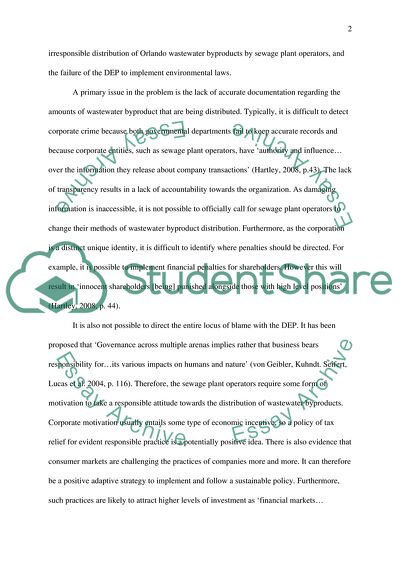
- Home
- Free Samples
- Premium Essays
- Editing Services
- Extra Tools
- Essay Writing Help
- About Us
- Studentshare
- Subjects
- Miscellaneous
- A problem in Central Florida that needs solving
A problem in Central Florida that needs solving - Essay Example

- Subject: Miscellaneous
- Type: Essay
- Level: Masters
- Pages: 4 (1000 words)
- Downloads: 0
- Author: cliftonkeeling
Extract of sample "A problem in Central Florida that needs solving"
It will be shown that in order to address the problem, conflicting discourses in environmental practice and capitalist agendas require resolution. The problem identified originates in Orlando but also affects the entire Florida Ecosystem. The problem that requires solving is the distribution of bacterial byproducts from Orlando wastewater. Currently Orlando’s treated wastewater byproducts are utilized as fertilizer for cropland. While this in itself is beneficial to the environment, problems arise in areas that are at risk of flooding.
In these periods, the bacterial sludge, consisting of nitrogen and phosphorous compounds, enters the streams and rivers of Florida; this results in the ‘foul waters of Lake Okeechobee, the failing health of the Everglades and even sick dolphins along the Florida coast’ (Spear, 2009, p.7). Despite the 2007 law stating that ‘officials “may not authorize the disposal of domestic wastewater residuals”’ (Spear, 2009, p.7), environmentalists are accusing the Department of Environmental Protection (DEP) of failing to enforce this law for the benefit of sewage plant operators.
These operators are also accused of distributing more of the byproduct to cropland than is required. The inaccurate records of the DEP contribute to the problem. Thus, the problem in Central Florida that needs solving is defined as: the irresponsible distribution of Orlando wastewater byproducts by sewage plant operators, and the failure of the DEP to implement environmental laws. A primary issue in the problem is the lack of accurate documentation regarding the amounts of wastewater byproduct that are being distributed.
Typically, it is difficult to detect corporate crime because both governmental departments fail to keep accurate records and because corporate entities, such as sewage plant operators, have ‘authority and influence…over the information they release about company transactions’ (Hartley,
...Download file to see next pages Read MoreCHECK THESE SAMPLES OF A problem in Central Florida that needs solving
Governance Research and Analysis
Helping Homeless Women with Co-Occurring Mental Health and Substance Abuse Disorders Recover
Hurricane Galveston Analysis
Debating Current Child Welfare Policies
Adapting transportation requirement to the population growth in the Central Florida Region
Stand Your Ground Laws and Homicide Rates
Mediation of a Conflict Situation
The Florida Department of Public Safety

- TERMS & CONDITIONS
- PRIVACY POLICY
- COOKIES POLICY